Monthly Summaries
Issue 24, December 2018
[DOI]
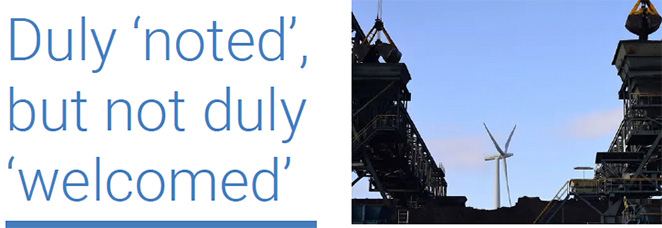
Global investors managing $32tn are urging governments to phase out all coal burning. (Alexander Koerner/Getty Images).
December media attention to climate change and global warming was up nearly 8% throughout the world from the previous month of November 2018, and up about 54% from December last year. Increase were detected in Asia (up 28%), Central/South America (up 19%), the Middle East (up 7%), North America (up 10%), Oceania (up 37%) and Europe (up 8%), while going down only in Africa (down 25%) this month compared to the previous month of November. Figure 1 shows increases and decreases in newspaper media coverage at the global scale – organized into seven geographical regions around the world – over the past 180 months (from January 2004 through December 2018).
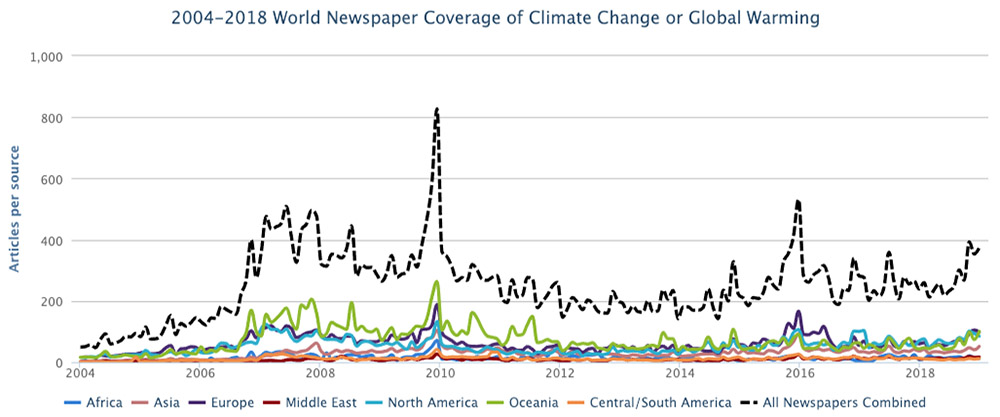
Figure 1. Newspaper media coverage of climate change or global warming in sixty-two sources across thirty-five countries in seven different regions around the world, from January 2004 through December 2018.
Moving to considerations of content within these searches, Figure 2 shows word frequency data in the dynamic spaces of Australian and New Zealand newspaper media coverage in December 2018.
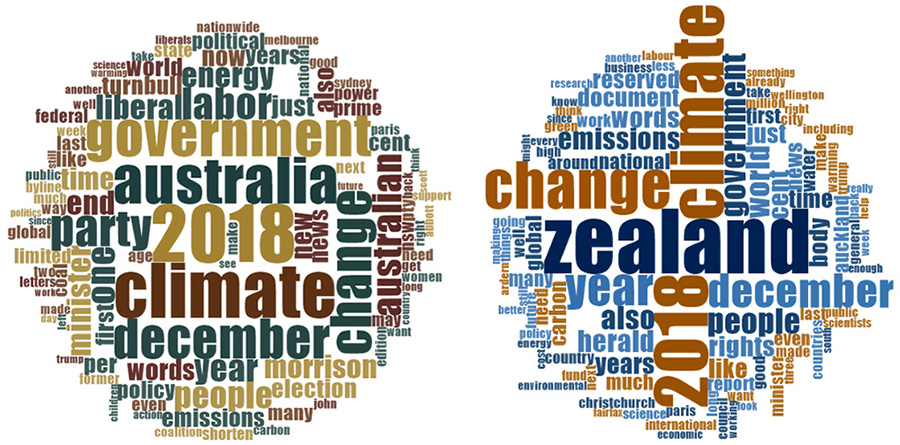
Figure 2. Word cloud showing frequency of words (4 letters or more) invoked in media coverage of climate change or global warming in Australian (left) and New Zealand (right) newspaper sources. Data are from five Australian sources – the Sydney Morning Herald, Courier Mail & Sunday Mail, The Australian, Daily Telegraph & Sunday Telegraph, and The Age – from three New Zealand sources – The New Zealand Herald, Dominion Post, and The Press.
In December, considerable attention was paid to political and economic content of coverage. Prominently, the 24th Conference of Parties meeting to the United Nations Framework Convention on Climate Change (COP24) took place in Katowice, Poland. Driven by a journalistic penchant for conflict, media attention was paid to COP24 debates regarding whether to ‘welcome’ or ‘note’ the October United Nations (UN) Intergovernmental Panel on Climate Change (IPCC) Special Report on impacts of 1.5oC warming. For example, an Associated Press article entitled ‘U.S., Russia, Kuwait and Saudis block key climate study at COP24’ described that “almost all 200 countries present in Katowice, Poland, had wanted to "welcome" the IPCC report, making it the benchmark for future action. But the U.S. and three other delegations objected…Russia, Saudi Arabia and Kuwait also called for the study to be ‘noted’ but not ‘welcomed’”. In addition, media stories covered efforts to agree on a Paris Agreement rulebook, and discussions regarding how to establish and sustain financial support from countries of the ‘global north’ to countries of the ‘global south’. For example, journalist Megan Rowling from Reuters reported, “More than 190 countries are meeting in the coal-mining town of Katowice through Dec. 14 to hammer out rules that will enable the Paris accord to be put into practice from 2020, and spur countries to strengthen their current climate action plans. Current pledges to cut emissions would lead to global warming of about 3 degrees Celsius this century … under the Paris deal, governments have pledged to hold temperature rise to “well below” 2 degrees C above pre-industrial times, and ideally to 1.5 degrees C. The world has already warmed about 1 degree C”.
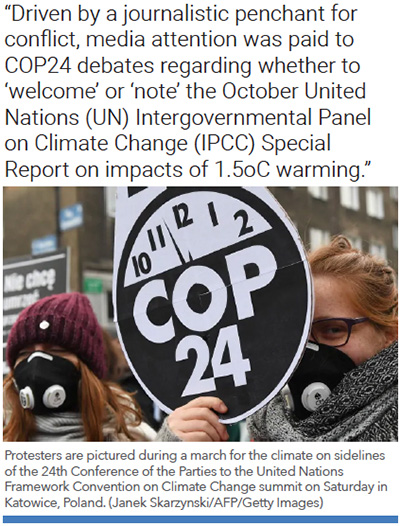 In concert with these talks, in a strongly worded letter, hundreds of investors with approximately $32 trillion in assets-under-management demanded that world governments increase their ambition on climate change through policy interventions that assist with progress along decarbonization pathways. They recommended putting a price on carbon and a phasing out of coal power in order to meet the terms of the Paris Agreement. This generated media attention. For examples, journalist Simon Jessop from Reuters reported, “A total of 415 investors from across the world including UBS Asset Management and Aberdeen Standard Investments signed the 2018 Global Investor Statement to Governments on Climate Change demanding urgent action”. Journalist Damian Carrington from The Guardian noted, “The investors include some of the world’s biggest pension funds, insurers and asset managers and marks the largest such intervention to date. They say fossil fuel subsidies must end and substantial taxes on carbon be introduced”.
In concert with these talks, in a strongly worded letter, hundreds of investors with approximately $32 trillion in assets-under-management demanded that world governments increase their ambition on climate change through policy interventions that assist with progress along decarbonization pathways. They recommended putting a price on carbon and a phasing out of coal power in order to meet the terms of the Paris Agreement. This generated media attention. For examples, journalist Simon Jessop from Reuters reported, “A total of 415 investors from across the world including UBS Asset Management and Aberdeen Standard Investments signed the 2018 Global Investor Statement to Governments on Climate Change demanding urgent action”. Journalist Damian Carrington from The Guardian noted, “The investors include some of the world’s biggest pension funds, insurers and asset managers and marks the largest such intervention to date. They say fossil fuel subsidies must end and substantial taxes on carbon be introduced”.
Many sub-global issues also percolated in media accounts. For example, on the domestic US front in December, the Andrew Wheeler-led Environmental Protection Agency (EPA) rolled out a plan to reduce restrictions on coal production. Journalist Stephanie Ebbs from ABC News reported “The Trump administration wants to make it easier for energy companies to open new coal-fired power plants, even as government data shows the U.S. is at the lowest level of coal use in decades”. Meanwhile By Nicole Gaouette and Rene Marsh from CNN noted, “The Trump administration will reverse an Obama-era coal emissions rule as part of its effort to loosen restrictions on the coal industry, just days after a US government report warned that aggressive action is needed to curb greenhouse gases and ease the impact of global warming. The reversal won't lead to the immediate construction of new coal-fired power plants, but it does send an immediate political signal that the Trump administration is intent on shoring up the coal industry and other energy interests”.
Ecological and meteorological dimensions of climate change were featured in a special report from NBC’s Sunday show Meet the Press. Host Chuck Todd devoted the full program to examining various connected dimensions of climate change, with touchpoints through the year’s hurricane and flood devastation in the Carolinas and the Florida panhandle, along with wildfires in California. The show featured a panel of experts: Dr. Kate Marvel from Columbia University and NASA Goddard Institute for Space Studies; Craig Fugate, President Obama's FEMA administrator; Michèle Flournoy, undersecretary of defense under President Obama; Anne Thompson, chief environmental correspondent at NBC News; and Florida Republican Congressman Carlos Curbelo. The program also included conversations with former New York City Mayor Michael Bloomberg and California governor Jerry Brown. Chuck Todd framed out the special report stating, “Good Sunday morning, and a happy New Year's weekend to everyone. This morning, we're going to do something that we don't often get to do, dive in on one topic. It's obviously extraordinarily difficult to do this, as the end of this year has proven, in the era of Trump. But we're going to take an in-depth look, regardless of that, at a literally Earth-changing subject that doesn't get talked about this thoroughly on television news, at least, climate change. But just as important as what we are going to do this hour is what we're not going to do. We're not going to debate climate change, the existence of it. The Earth is getting hotter. And human activity is a major cause, period. We're not going to give time to climate deniers. The science is settled, even if political opinion is not. And we're not going to confuse weather with climate. A heat wave is no more evidence that climate change exists than a blizzard means that it doesn't, unless the blizzard hits Miami…But we're going to begin with a look at a crisis that's been ignored for too long.” As such, the show also featured political, economic, cultural and scientific themes as well.
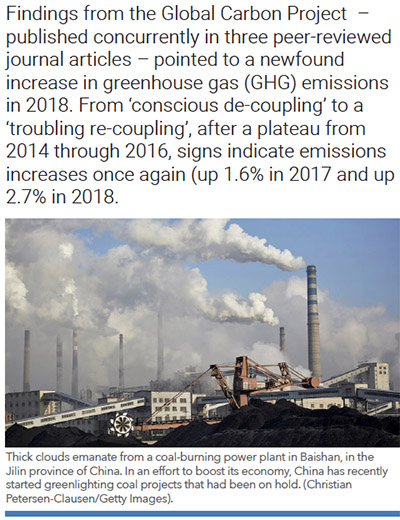 Moving to media accounts focused on primarily scientific dimensions of climate change and global warming, many new studies relating to climate change garnered attention. For example, findings from the Global Carbon Project – published concurrently in three peer-reviewed journal articles – pointed to a newfound increase in greenhouse gas (GHG) emissions in 2018. From ‘conscious de-coupling’ to a ‘troubling re-coupling’, after a plateau from 2014 through 2016, signs indicate emissions increases once again (up 1.6% in 2017 and up 2.7% in 2018). Journalist Christopher Joyce from US National Public Radio reported, “For three years — 2014 through 2016 — the amount of atmospheric CO2 had leveled off. But it started to climb again in 2017, and is still rising…the CO2 increase in 2017 over the previous year was 1.6 percent, and in 2018 it's looking like emissions will have grown a further 2.7 percent. With the economy strong throughout most of the world, 2019 looks to be headed in the same direction, in terms of carbon emissions”. Meanwhile, journalist Seth Borenstein from the Associated Press noted that this was a ‘climate reality check’, writing, “After several years of little growth, global emissions of heat-trapping carbon dioxide experienced their largest jump in seven years, discouraging scientists”. More directly, Damian Carrington from The Guardian quoted David Reay from the University of Edinburgh who said of the report, “its message is more brutal than ever: we are deep in the red and heading still deeper. For all our sakes, world leaders must now do what is required”.
Moving to media accounts focused on primarily scientific dimensions of climate change and global warming, many new studies relating to climate change garnered attention. For example, findings from the Global Carbon Project – published concurrently in three peer-reviewed journal articles – pointed to a newfound increase in greenhouse gas (GHG) emissions in 2018. From ‘conscious de-coupling’ to a ‘troubling re-coupling’, after a plateau from 2014 through 2016, signs indicate emissions increases once again (up 1.6% in 2017 and up 2.7% in 2018). Journalist Christopher Joyce from US National Public Radio reported, “For three years — 2014 through 2016 — the amount of atmospheric CO2 had leveled off. But it started to climb again in 2017, and is still rising…the CO2 increase in 2017 over the previous year was 1.6 percent, and in 2018 it's looking like emissions will have grown a further 2.7 percent. With the economy strong throughout most of the world, 2019 looks to be headed in the same direction, in terms of carbon emissions”. Meanwhile, journalist Seth Borenstein from the Associated Press noted that this was a ‘climate reality check’, writing, “After several years of little growth, global emissions of heat-trapping carbon dioxide experienced their largest jump in seven years, discouraging scientists”. More directly, Damian Carrington from The Guardian quoted David Reay from the University of Edinburgh who said of the report, “its message is more brutal than ever: we are deep in the red and heading still deeper. For all our sakes, world leaders must now do what is required”.
Also, in December a World Health Organization report came forward with findings that costs of inaction on climate change would be felt particularly in area of public health. The report noted that substantive and sustained GHG emissions cuts could prevent millions of lives lost each year from air pollution-related threats. News media covered this report in the lead up to COP24. For instance, journalist Jacqueline Howard from CNN reported, “Meeting the commitments of the 2015 Paris climate agreement could save millions of lives and hundreds of billions of dollars by the middle of the century, according to the report. Meeting the goals put forth in the Paris agreement would be expected to save more than 1 million lives a year from air pollution alone by 2050, it says. Drivers of climate change, principally fossil fuel combustion, contribute to about 7 million deaths worldwide from outdoor and indoor air pollution annually, according to the report”.
Across the globe in December, there was a range of stories that intersected with the cultural arena. For example, Reuters reported on a 65,000 person march through the streets of Brussels, Belgium in early December to ‘claim the climate’. And the ‘Extinction Rebellion’ movement for climate action warranted coverage in December. On December 21, journalist Jim Waterson from The Guardian reported, “The BBC’s central London headquarters has been put on lockdown due to a protest by climate change campaigners who are demanding it uses its status as national broadcaster to declare a “climate and ecological emergency”. Extinction Rebellion, a direct action group that has recently shut down key London roads, has demanded that the BBC makes the environment its “top editorial issue”. Broadcasting House was locked down early on Friday afternoon, with BBC staff and guests unable to enter or leave the building while security kept the peaceful but noisy protesters away from the entrance. Extinction Rebellion activists, who are demanding a meeting with the BBC director general, Tony Hall, said the corporation had a duty to broadcast about climate change with “the level of urgency placed on informing the public about the second world war”.
In 2019, we at the Media and Climate Change Observatory will indefatigably continue to monitor and analyze media coverage of climate change and global warming. In so doing, we will continue to work to carry out the wider mission of the International Collective on Environment, Culture and Politics (ICECaPs) to “explore the complex and dynamic cultural and political dimensions of environmental problems at the intersection of science and society…and improve understanding while broadening discussions about the nature of evolving environmental challenges”. See https://sciencepolicy.colorado.edu/icecaps for more information about ICECaPs.Stay tuned (and brace as needed) for the months to come.
